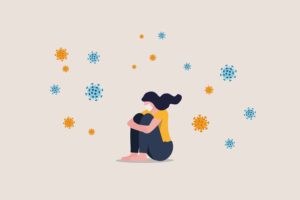Emotional Wellness
By Maisha Ahmed
NY Project Hope is a crisis counseling program that provides support and resources to help people cope with the challenges of the Covid-19 pandemic

Although some people might believe that emotional wellness may mean being happy most of the time, that is absolutely not true. Rather it is the ability to be aware and understand your feelings, as well as having the ability to stay resilient through life’s hurdles and obstacles. When a person is aware of their emotions, they tend to have healthier reaction to situation that can invoke certain emotions. For example, when I was in late teens and early 20’s, I used to think of myself as a person who is often controlled by their emotions rather than being a person who can control my emotions. In every stressful situation, I would resort to tears. But as I got older, I began to understand why and how I react in stressful situations and in turn, I managed to cry less and was able to remain calmer during those situations. That itself is what contributes to the definition of emotional wellness.
Tips to Sustain Emotional Wellness
- Staying Positive-This might sound like one of those “easier said than done” kind of situation, but this can be done with lots of patience and consistency. What helps me to stay positive is keeping two types of journals. One journal is solely for the purpose of writing down negative thoughts and feelings, as well as daily occurrences. The other journal is to write down things I am grateful for and for the positive interactions I had during the day. In addition, my friend and I decided to call each other once a day and say at least five things we like about ourselves to keep each other accountable. This has not only been changed my pessimistic view on life but increasing my self-esteem and helping me realize that I have good people in life who care about me.
- Staying Connected-I know the pandemic has made maintaining relationships with others a lot more difficult with the occurrence of lockdowns and mandated rules of social distancing. However, it is during the times of adversity that we need to reach out to others more than ever. Whether it’s through social media, mobile devices, or even good old fashion writing letters, keeping in touch with our loved ones and having social support can give us immense emotional strength to stay resilient. If meeting in person or having gathering is still deemed too unsafe, I would highly suggest joining a virtual group that focuses on your hobby or taking an online class or even joining our Thursday Virtual Workshop just to keep a positive connection with others!
- Establishing Boundaries-Remember to never do anything you’re uncomfortable with whether it’s related to a social situation or work situation; if you agreed to help someone or take in more work, it shouldn’t leave you feeling with dread or anxiety.
- Healthy Sleeping Habits-I can’t stress enough on the importance of getting an adequate amount of sleep and the effect it can have on one’s emotional well-being. Lack of sleep can lead to emotional distress, increase in anxiety and depression, lack of focus, etc. Some tips on establishing a healthy sleeping routine would include going to sleep at the same time every day, avoiding caffeine before bedtime, reducing electronic usage during night time, and even exercising.
Benefits of Emotional Wellness

- Having healthy coping mechanisms or resources that leads to strong resiliency
- Able to identify desires in life and partake in positive actions to obtain that desire
- Increase self-confidence
- Reduction in stress, blood pressure, blood sugar, etc.
- Improving social skills and relationships with others
As always, Project Hope is also here to help you! Sometimes it can be helpful to talk to someone you don’t know! Want to know more about how we can help? Give us a call at 845-762-2275. Talking to us is always free, anonymous, and confidential.
Maisha Ahmed is a crisis counselor from Independent Living, Inc. working on with the NY Project Hope program.
Further Reading and References:

